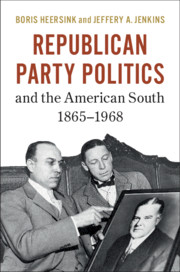Book contents
- Republican Party Politics and the American South, 1865–1968
- Republican Party Politics and the American South, 1865–1968
- Copyright page
- Contents
- Tables
- Figures
- Preface
- 1 Introduction
- 2 The Republican Party and the South: Some Preliminaries
- Part I The South and National Republican Party Politics, 1865–1968
- 3 The Rise and Fall of a Republican South, 1865–1877
- 4 The Attempt to Rebuild the Republican Party in the South, 1877–1896
- 5 The System of 1896 and Republicanism in the South, 1897–1932
- 6 Toward a Modern Southern Strategy, 1933–1968
- Photos
- Part II Southern Republican Party Politics at the State Level
- Index
6 - Toward a Modern Southern Strategy, 1933–1968
from Part I - The South and National Republican Party Politics, 1865–1968
Published online by Cambridge University Press: 06 March 2020
- Republican Party Politics and the American South, 1865–1968
- Republican Party Politics and the American South, 1865–1968
- Copyright page
- Contents
- Tables
- Figures
- Preface
- 1 Introduction
- 2 The Republican Party and the South: Some Preliminaries
- Part I The South and National Republican Party Politics, 1865–1968
- 3 The Rise and Fall of a Republican South, 1865–1877
- 4 The Attempt to Rebuild the Republican Party in the South, 1877–1896
- 5 The System of 1896 and Republicanism in the South, 1897–1932
- 6 Toward a Modern Southern Strategy, 1933–1968
- Photos
- Part II Southern Republican Party Politics at the State Level
- Index
Summary
The 1932–1968 period represents a crucial era of change between the Republican Party and the American South. With the New Deal realignment, the GOP slowly but surely came to the realization that some form of electoral competition in the South could no longer be avoided for the party to have a chance at winning presidential elections and congressional majorities consistently. After FDR’s death, and with liberals and conservatives in the Democratic Party divided on civil rights, Republicans – for the first time – had both the opportunity and the need to advance in the South. But how to take advantage of this opening in the South while simultaneously not alienating traditional Republican voters elsewhere proved to be a difficult puzzle to solve. While the 1964 election showed that catering to Dixiecrats could open the South up to the Republican Party, Goldwater’s dismal performance everywhere else temporarily scared Republican leaders. A breakthrough in the inherent conflict between (a) the party’s failure to succeed in the South and (b) the price it paid outside of the South for trying was forged by Richard Nixon, in his efforts to win the 1968 presidential nomination. In assessing both the internal dynamics within the GOP as well as the national effects of previous Republican southern strategies, Nixon identified a winning strategy. By rejecting segregation, Nixon reassured voters outside of the South that he was not giving in to the worst elements in the Dixiecrat movement. Yet Nixon’s support for the less extreme policies that Southern conservatives were demanding – a slowdown in the implementation of civil rights reforms – was tied to the broader sense of insecurity whites felt across the country with regard to job safety and crime.
- Type
- Chapter
- Information
- Republican Party Politics and the American South, 1865–1968 , pp. 163 - 192Publisher: Cambridge University PressPrint publication year: 2020



